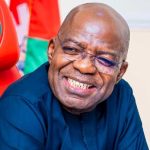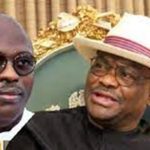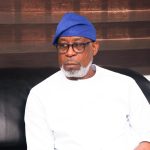Insecurity, Under-development: Buratai, others see hope in research and training
December 20, 2021

Nigeria’s Ambassador to the Republic of Benin, Lt. Gen Tukur Yusufu Buratai (Retired) and Governor of Nasarawa, Alhaji Abdullahi Sule have said that the current insecurity and development challenges can be surmounted if the nation can transform its potential to realities.
This, they argue can be achieved through investment in research and development which will ultimately help in conflict resolutions, strategic capacity building and application of such capacity to achieving socio-economic harmony and advancement.

Buratai, a former Chief of Army Staff, COAS, and the Governor disclosed this at the ground breaking and fundraiser of the Tukur Buratai Research Centre (TBRC) which will work in partnership with the Nasarawa State University at Gora, Keffi on Saturday, December 18, 2021.
When completed, the centre will comprise a 600-capacity auditorium equipped with modern learning facilities and conference halls for research and study purposes.
Buratai described the research centre as a place to birth new home-grown ideas and solutions to our peculiar challenges rather than the practice of copying recommendations meant for other nations without taking into cognizance our needs and uniqueness of our environment.

He sees the research centre as a genuine hub and rallying point for pragmatic backward integration for Nigeria.
The well attended event brough together the military, civilian populace, politicians, the academia and traditional leaders to chart a course for the resolution of multiple conflicts bedeviling the nation.
Gen Buratai said in his remark: “Corruption, insecurity due to terrorism and banditry, inadequate infrastructure, issues in governance and an inept educational system are all systemic flaws. But with every amount of commitment made to research and training, as well as a strong national orientation, one may be confident that we, as a people and a nation, are on the right track to addressing them.
“As I have said in so many fora, there can be no real development without security and peace, and in the same vain, there must be economic opportunities, equity and justice for security and peace to exist which in turn serves as the foundation or pillars of development.
“Nigeria as of today is being confronted with myriad challenges ranging from insecurity which is a culmination of prolonged and endemic socio-economic challenges, ignorance because of poor school enrolment and poor quality education which also has a lot to do with inadequate quality teachers, weak justice system characterized by slow execution of judgment to serve as a deterrence to offenders, and lastly a general inability by those in the positions of leadership to embrace science and technology to generate power and add value to our natural resources before exporting them so as to earn foreign exchange,” he said.
Ambassador Buratai who has seen it all in service to the nation was forthright when he listed the key elements that would make Nigeria great. He said: “Increased productivity, improved socio-economic well-being, increased income, infrastructure development, job creation, and improved quality of local produce for both domestic and international markets remain the hallmarks of a well-thought-out research initiative and development agenda by a prosperous nation led by a visionary/corrupt-free leader.
“I believe that there exists a gap in our polity that TBRC as a think-tank can fill through research and policy development especially in the areas of security and defence, peace, conflict management, climate change, leadership and development.”
He gave instances of how research and capacity building have coalesced to enhance the fortunes of many nations.
“Evidence abounds in nations throughout the world that house research centre dedicated to developing necessary initiatives and or strategies that will aid in mitigating development issues and maximizing environmental potential.
“While a few of nations have achieved significant milestones and or breakthroughs in this area, many others are still struggling to find their footing in terms of designing mechanisms by which their potentials can be fully realized.
“I have witnessed us adopting economic policies from the Bretton Woods institutions without taking into account the fact that what works elsewhere may not necessarily work here. I would like to utilize this TBRC platform to emphasize that now is the moment for us to turn within and devise home-grown solutions to our unique difficulties. Finding solutions to development challenges through research and development.
“TBRC is our modest way of contributing to national development and giving back to society through a well-thought-out approach that we believe will have a long-lasting impact on the country.
“As indicated in the schedule of activities, TRBC is collaborating with Nasarawa State University, Keffi, in the fields of strategic studies, peace and conflict studies, and leadership for development. Our objective is geared towards a more secured and better Nigeria for all Nigerians.”
According to the ex-COAS, the anticipated benefits of a functional research and development program include training people with the necessary capacity to conduct economic tasks with an appreciable degree of skill in order to achieve maximum production.
These capacities, he said, include equipping individuals with the knowledge, skills, and abilities necessary to successfully harness and exploit the potentials found in their surroundings.
Drawing a nexus between leadership and problem-solving, he said: “Leadership, in broad terms, is a social practice that entails influencing others. The process through which an individual establishes direction, influences a group, and guides the group toward a certain purpose or mission has been defined as leadership. In some ways, leadership is defined by what leaders do. The following observations have been made: Leadership is a characteristic, not a title. Leadership is about encouraging others to live the organization’s vision, mission, and values.” These virtues are what the research centre will try to inculcate in people, he explained.
“The world of today is no longer an environment that responds to those who have military might or have numerical strength; it also doesn’t give a damn if a country has an armada of natural resources like the ones we have in Nigeria. Sometimes, I picture those in positions of leadership as sailors of ship cruising on the ocean, supposedly taking their people to the Promised Land. Today’s world simply responds and obeys those who are well informed and those who have fool-proof policies.
“This is why research centres and think-tanks like TBRC are critical to success of every leader. There is no gainsaying the fact that leadership without well-informed and fool proof policies will lack clear vision and direction. This is the major cause of setbacks in most African nations.
“As a result of the myriad of socio-economic and political challenges, it may be reasonable to argue that Nigeria can, to a large degree, resolve her development issues through research and training.
“The higher the development objective, the more preparedness for potential roadblocks should be. This is where specialized training and research come into play, both of which are geared towards the nation’s development.”
He noted that inadequate research and development implementation in Nigeria create a massive void in the nation’s progress.
Then he asked the big question: “Is Nigeria ambitious enough to dare to innovate in response to the nation’s and citizens’ needs?”
In his address, Vice Chancellor, Nasarawa State University, Prof. Suleiman Bala Mohammed disclosed that the Institute of Governance and Development Studies, through which the University is in strategic partnership with the Tukur Buratai Research Centre hosts the university’s flagship postgraduate courses in Security and Strategic Studies, Forensic Investigation and Accounting, Peace and Conflict Studies and Public Procurement.
“Over the years, the Institute had her doctoral students examine contemporary security issues in Nigeria with the view to disseminating them through organized engagements with different agencies of government, the political class and civil society organizations. We have also used published research reports and conferences to reach the public with our findings and recommendations.
“The University under my watch, has reorganized the Directorate of Research to coordinate and improve the quality of publications in tune with international academic standards. We are also committed to ensuring that our research works address both contemporary societal challenges as well as make recommendations to research and development needs of corporate organizations and industries.
Governor Abdullahi Sule performed the ground breaking ceremony assisted by Senator Abdullahi Adamu and Senator Ali Ndume, Chairman Senate Committee on Army.
Others were representatives of the Chief of Defence Staff, Service Chiefs, the Diplomatic Corps, while the 2nd Emir of Keffi, Chindo Yamusa, the Emir of Biu led other traditional rulers including Oba Hameed Adekunle Oyelude Wakama, the Olowu of Kuta, Osun State, to the ceremony.
A little over N220 million was realized as donations on the spot.







